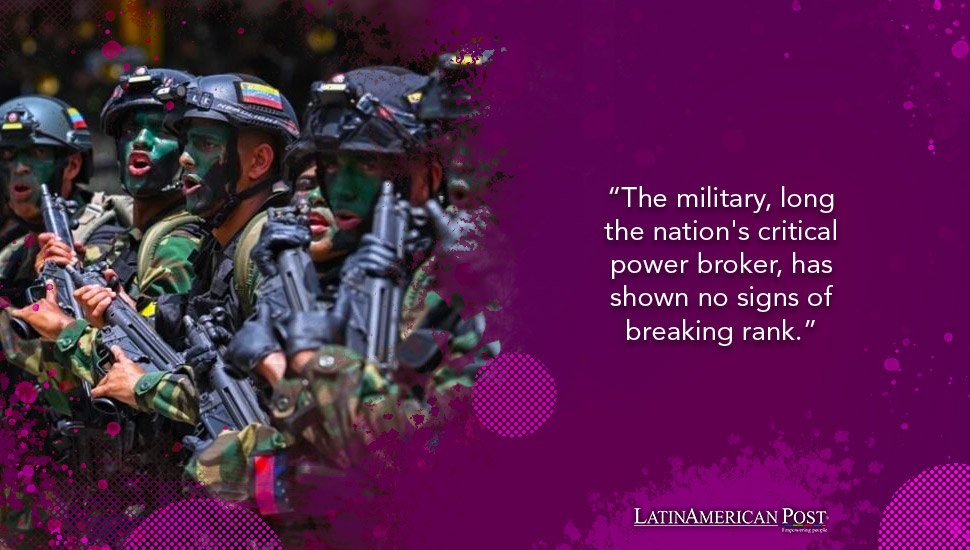Military Loyalty Keeps Maduro in Power Amid Venezuelan Protests

As Venezuela erupts in protest over Nicolás Maduro’s contested election victory, the military’s unwavering support plays a critical role in sustaining his regime despite widespread opposition and international condemnation.
The morning after Venezuela’s streets erupted in protest against Nicolás Maduro’s self-declared victory, Defense Minister Vladimir Padrino López took to the airwaves to clarify the military’s stance on the alleged electoral fraud. “It’s something truly absurd; it’s something completely improbable,” scoffed Padrino López, who has commanded the nation’s military for nearly a decade. The unrest, he said, “is a contradiction fomented by the extreme right.”
Despite regional powers from the US to Colombia and Brazil casting doubt on Maduro’s victory and opposition leader María Corina Machado asserting that her stand-in candidate defeated the authoritarian incumbent by a wide margin, analysts say that these claims might not matter as long as the armed forces remain loyal to Maduro. The military, long the nation’s critical power broker, has shown no signs of breaking rank.
According to political analyst Serbin Pont, Padrino López’s remarks, flanked by members of the military high command, appeared to “close the door on negotiations.”
A History of Military Support
During Maduro’s 11 years in power, Venezuela’s security forces have consistently stood by his side, quashing nationwide protests in 2014 and 2017 that erupted after past electoral abuses. In 2019, US-backed opposition leader Juan Guaidó claimed he had enough military support to unseat Maduro, only to see his efforts unravel days later.
In return for their loyalty, Maduro has rewarded the armed forces with lucrative control over ports, oil concessions, and mining projects. He has also filled his cabinet with decorated officers and expanded the military ranks, a practice that began during the term of the late Hugo Chávez, Maduro’s predecessor and mentor. Chávez, a former army colonel, called for a “civil-military union” and appointed soldiers to positions traditionally held by civilians.
Estimates of the military’s current size vary widely, ranging from around 100,000 soldiers to as many as 400,000, including militia members. However, desertions have plagued the military in recent years as Venezuela’s economy has collapsed under Maduro’s leadership.
Low Morale and Dissent
Low morale within the military has led to sporadic challenges to Maduro’s regime. Military dissidents plotted against him ahead of his election to a second term in May 2018, and three months later, he survived a failed drone assassination attempt.
The government has since clamped down on dissent, both inside the barracks and beyond Venezuela’s borders. For instance, Chile is demanding that Caracas investigate the kidnapping and death of a former Venezuelan lieutenant who had fled to Santiago after participating in a foiled plot to topple Maduro. Meanwhile, human rights groups reported that 25 students at Venezuela’s national police academy went missing after protesting their obligation to vote for Maduro.
These actions likely deter lower-ranking military members from disobeying orders to suppress the protests following the disputed election. The government announced 749 arrests in response to the protests, while opposition leaders denounced the detention of Freddy Superlano, a prominent ally of Machado, by security forces.
A Deliberately Structured Military
Venezuela’s military is deliberately structured to safeguard against any potential challenge to Maduro. Lower-ranking troops are indoctrinated to favor the government and are constantly surveilled by security services to identify and imprison anyone whose loyalty might be wavering.
The fear of sanctions or trials for alleged human rights crimes prevents generals from breaking with the ruling socialists. Ahead of the July 28 vote, Machado offered amnesty if the military ensured a political transition. “Don’t fail us,” she said in a video message directed at the military. “We won’t fail you.”
However, this offer has been disregarded. Padrino López and other top brass stood by Maduro as he denounced the unrest as an attempt by domestic and international opponents to destabilize the nation. “We’ve seen this movie before,” Maduro said in a televised address. “It has a beautiful and happy ending for you, compatriots.”
International and Regional Reactions
The international community has largely condemned the election and subsequent crackdown. Regional powers such as the US, Colombia, and Brazil have expressed doubt over the legitimacy of Maduro’s victory and called for transparency and fairness in the electoral process. However, Maduro’s stronghold over the military diminishes the likelihood of significant change stemming from external pressure.
In Latin America, where military influence in politics is not uncommon, Venezuela’s situation serves as a stark reminder of the delicate balance between civilian governance and military power. Countries like Brazil and Colombia have faced challenges with military involvement in political affairs, making Venezuela’s struggle particularly resonant.
As protests continue and international pressure mounts, the question remains whether the Venezuelan military will maintain its unwavering support for Maduro or if cracks will begin to show. The economic and social crisis in Venezuela is profound, with widespread poverty, hyperinflation, and mass emigration. The military’s loyalty has been a cornerstone of Maduro’s ability to maintain power despite these challenges.
The opposition, led by figures like María Corina Machado, faces an uphill battle. Without military support, their ability to effect change remains limited. However, continued international attention and pressure could influence the dynamics within the military and the broader political landscape.
Venezuela’s current turmoil underscores the critical role of the military in the nation’s political future. As Maduro clings to power amidst allegations of electoral fraud and widespread protests, the unwavering loyalty of the armed forces remains his most vital asset. The situation highlights the complex interplay between military support, political power, and the quest for democracy in Latin America.
Also read: Protests Erupt in Venezuela After Disputed Election Results
The international community will closely watch the unfolding events in Venezuela as they reflect broader themes of authoritarianism, military influence, and the struggle for democratic governance in the region. Whether the military will continue to support Maduro or shift its allegiance could determine the future trajectory of Venezuela’s political crisis.





